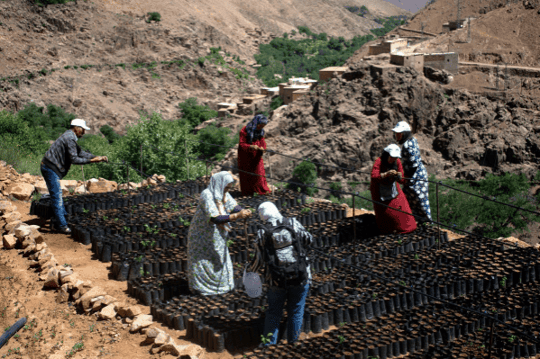On Tuesday, 25th of May we started our journey to the Toubkal community. We went together with the project manager Amina El Hajjami, program assistant Safae Ben Karroum, and volunteer Youssef Tahiri. Although we did not know each other, I easily joined a group of highly motivated, knowledgeable, and smiling people. The way to Toubkal was marked by many bends, small villages on the way, and beautiful views. Millennial relationships between humans and nature have shaped the landscapes of the High Atlas Mountain and this is certainly breathtaking.
After we arrived at our accommodation Dar Amsouzzart we met with a group of women from the local cooperative from the village called Aguerzrane. The women with the support of HAF and the USAID Farmer-to-Farmer Program recently started a cherry tree nursery. The tree nursery is set in the terraced area of the Atlas Mountains. During the workshops, women learned how to plant trees, water plants, manage the field, etc. and this helped them to independently manage the tree nursery which gives women a monthly income. That day highly motivated women were also discussing with us about their future plans and how HAF can support them.
During the fieldwork we met a lot of happy faces of the locals, those faces are definitely proof that HAF projects are achieving their purpose. As the director of the project Amina El Hajjami said to me: “As long as I see the result, nothing is too hard to do.” Gratitude was repeatedly expressed to us by invitations to traditional Moroccan tea, coffee, or homemade delicacies.
Afterward, we were warmly welcomed by the president of the village Missour. The Foundation would like to help the women of this community to build new terraces for agriculture in order to support their cooperative and the local economy. HAF staff checked the area where they could build new terraces and plant more trees in the future.
On the 26th we spent mostly in the fields of the nearby village Amosouzzart. HAF in collaboration with Credit Agricole Foundation helps local farmers to secure organic certification. In order to apply for the certification for mainly walnuts and almonds we measured the sizes of each farmer’s lands. Farmers recognize the added value of organically grown plants and they were proud to tell us that they do not use any chemicals for their trees. We could hear farmers saying many times: “Here everything is bio.”
The day was spent tracking the farmer’s land with the accompaniment of a local farmer. Despite walking a lot up and down the terraced fields, we still had a chance to sweeten up with nicely ripe cherries and refresh ourselves with water from the springs.
On the third day, we continued tracking the farmer’s land sizes. Farmer Lachen received us and took us through the terraces of Agadir village. Farmers here seem to feel very comfortable in the mysterious Atlas mountain. They deftly overcome the ascents and valleys of this hilly area without much difficulty. They also find themselves very well among the fields, which are intertwined with various waterways, water springs, terraces, and trees.
Despite being inspired by the amazing work of the project director Amina El Hajjami, I was also fascinated by the passion and joy of local farmers. Devoted volunteer Youssef Tahiri and always smiling project assistant Safae Ben Karroum also contributed to the smooth running of the fieldwork. Even though the terrain in the Toubkal region is not easy – we have seen villages that are facing a lack of water, the terrain is difficult, and the chances of landslides are high – people still find amazing ways to grow vegetables and plant fruit trees. Green terraces into rocky slopes and countless waterways, give the villages a unique view. This is proof of a strong will and connection with nature.
As someone who grew up on a high mountain farm myself, I was able to identify extremely well with the locals. At the same time, a visit to the Toubkal community inspired me for new projects in my home community. Above all, I recognized the tremendous importance of planting trees, which is important not only for the local economy but also for the environment.
